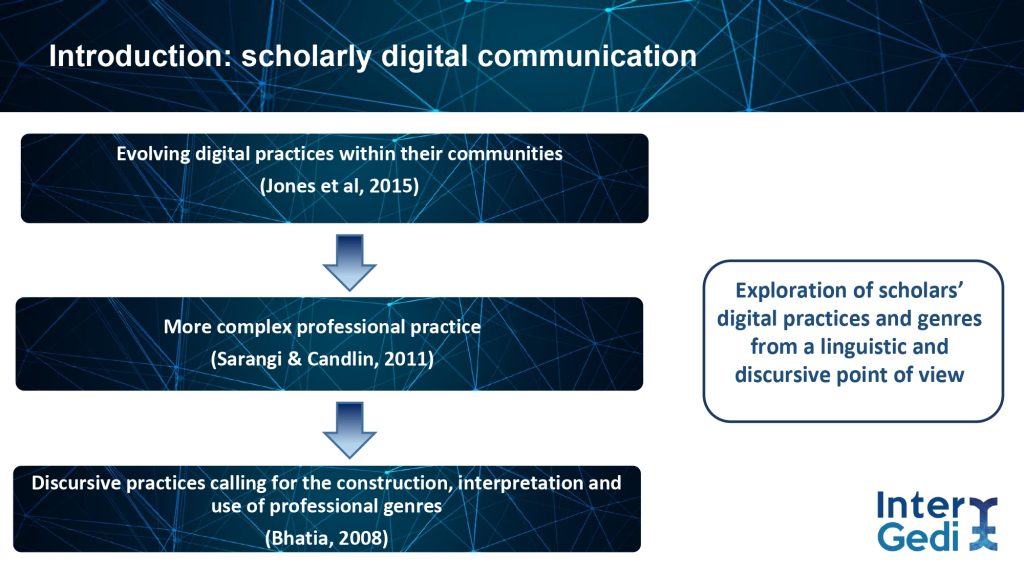UPCEL 2022: Pilar Mur-Dueñas explored the challenges of analysing digital scholarly discursive practices in her plenary lecture

Pilar Mur-Dueñas was invited to give a lecture at the hybrid conference UPCEL 2022 (4th International UCM Predoctoral Conference on English Linguistics), organised by the Universidad Complutense (Madrid) on 24th – 25th January. In her on-site talk, Mur-Dueñas addressed the challenges that arise from analysing digital academic discourse, and how discourse analysts can approach them. She explained that digital practices are undergoing an evolution and becoming more complex, so the need has arisen to adjust and combine methodological frameworks to analyse these new and evolving digital scholarly communication practices.
The full abstract of Pilar Mur-Dueñas’ talk can be consulted as follows:
Scholars’ digital communication practices: the challenges of analysing the publication and dissemination of knowledge in English
Abstract
Scholars are increasingly encouraged not only to publish their research findings in English-medium high-impact journals, books or monographs, but also to disseminate their knowledge production and to ensure the visibility of their findings, bringing them close and making them accessible to different audiences and stakeholders. This transfer and dissemination of scientific knowledge is frequently done online through different digital practices and genres, and in English, especially when undertaken within the framework of international projects, with the intention to reach wider audiences. All of these professional practices can pose discursive challenges for scientists and researchers in general and for those who do not have English as their L1 in particular.
These discursive challenges, thus, offer the discourse analyst a central opportunity to explore scholars’ new digital practices and genres, such as blogs, research project websites, or social networks (e.g. Twitter, Facebook, Instagram, ResearchGate or Academiaedu), which have emerged as a response to evolving social contexts and demands. Bearing in mind their communicative purpose and function, we need to look into their characteristic lexico-grammatical, pragmatic, discursive, rhetorical, and multimodal conventions. The digital medium has brought with it affordances and technicalities which have promoted the interactivity, interdiscursivity, hybridity and multimodality of online academic genres. As a result, many methodological perspectives and frameworks originated for the study of static, print texts and textual practices need to be adjusted, modified, or supplemented to tackle the analysis of such digital scholarly communication practices. The affordances and technicalities that the web 2.0 offers can problematise the compilation of a corpus of digital texts or the application of frameworks such as metadiscourse to analyse their interpersonal dimension.
I will draw on our InterGEDI research project analysis of institutional websites (intergedi.unizar.es) and on our compiled EUROPRO digital corpus to illustrate how we have tackled the analysis of digital scholarly discursive practices, in general, and the visibility of the research groups which generate and disseminate scientific knowledge, in particular. In all, it is my intention in this talk to look into the challenges that digital practices pose for the discourse analyst and to discuss some theoretical and methodological approaches to the study of digital academic discourse.
